On Writing "Prisoners in the Mirror"
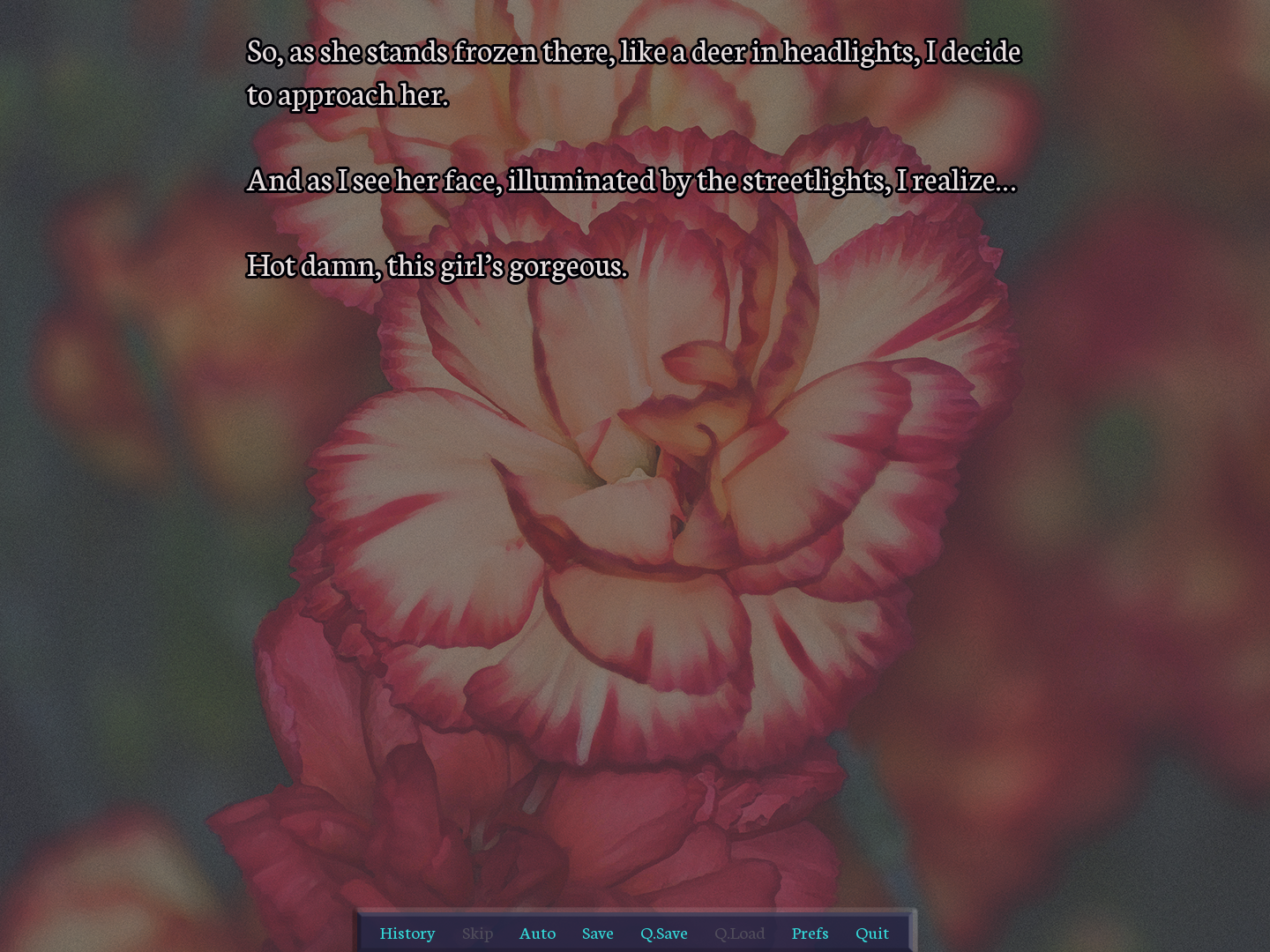
Content notice: This post contains discussions of underage sexual activity and child abuse. You should really read our VN first before reading this. The same content warnings that apply to it apply here.It's been a little over three weeks since the release of our visual novel, Gravity House Duology. We ended up changing the name of it after realizing calling it "Gravity House Demo" was confusing some people into thinking it was gonna get an update or something. It's not. Well, maybe it is, but if it was, it'd be like, as part of a separate larger project that'd be its own thing altogether.
Since a decent handful of people have played our game now, and a shit ton more people downloaded it in the wake of… y’know… the itch disaster… and maybe there's an audience for a post along these lines, I feel inclined to write a little bit of a more detailed postmortem going into exactly what the thought process was behind my contribution to the game. In other words, I’m going to talk in as much detail as I think I can safely muster about what inspired “Prisoners in the Mirror”, and why it was written and presented in the exact way it was.
This isn’t about the other story in the duology, “Colony-Organism: Microbes of Love and Pain”, which was entirely Ophelia’s, so I can’t really talk about it since I didn’t make any decisions with it outside of the image choices. You should read that story too.
Obviously there’s spoilers here, and I’m writing this with the assumption that anyone reading already has read the VN and already knows what happens. So, if you haven’t, please, stop reading this and go read that first! It’s totally free and will only take you about an hour, at most. If you’re still here, I’ll assume you’ve either already read it or that you don’t care about the spoilers, so, yeah.
Anyway!
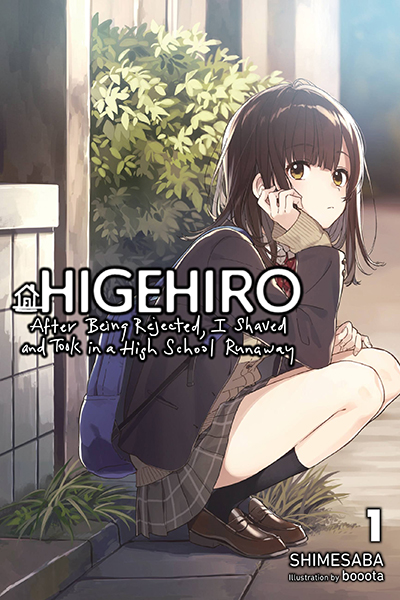
The impetus for “Prisoners” came about a little over four years ago, when I was scrolling down Twixter and happened upon a thread from someone we followed at the time, very animatedly soapboxing about the problematicity of an anime/light novel series called Higehiro. The general gist of it was that it’s about a salaryman who lets a high school girl who ran away from home stay at his house, and this person was saying that it’s creepy and gross and all that, for all the reasons you’d probably figure someone would say that.
Now, I must make it clear before I go on- I have not read one page, nor watched one second, of this series or any of its adaptations. I’ve taken a cursory look at the Wikipedia page and uh, seen the cover, I guess. I have no opinion on Higehiro. I don’t think it’s bad, I don’t think it’s good, I don’t know, I don’t really care.
However, hearing about this series, and how supposedly terrible it was, I couldn’t help but thinking:
But would it be good if it was yuri?
Despite not being interested much in Higehiro and figuring it was probably regular old hetslop, I did find the premise intriguing, as y’know, a formerly prolific teenage runaway.
I had a really bad home life as a teen, and ran away several times, sometimes to the point of fleeing our home state, and once, when I was fifteen, to the point of spending nearly a week hitchhiking three entire states away. I just wanted to get out of that house, and the legal fact of being a minor who didn’t have that right pissed me off. The idea of finding an adult who would’ve been willing to put themselves at risk to harbor me was thrilling and intriguing.
So, I sat with the idea for about three years or so, and then I played the first two chapters of The Coffin of Andy and Leyley.
Which, spoilers I guess, involves parricide in its plot.
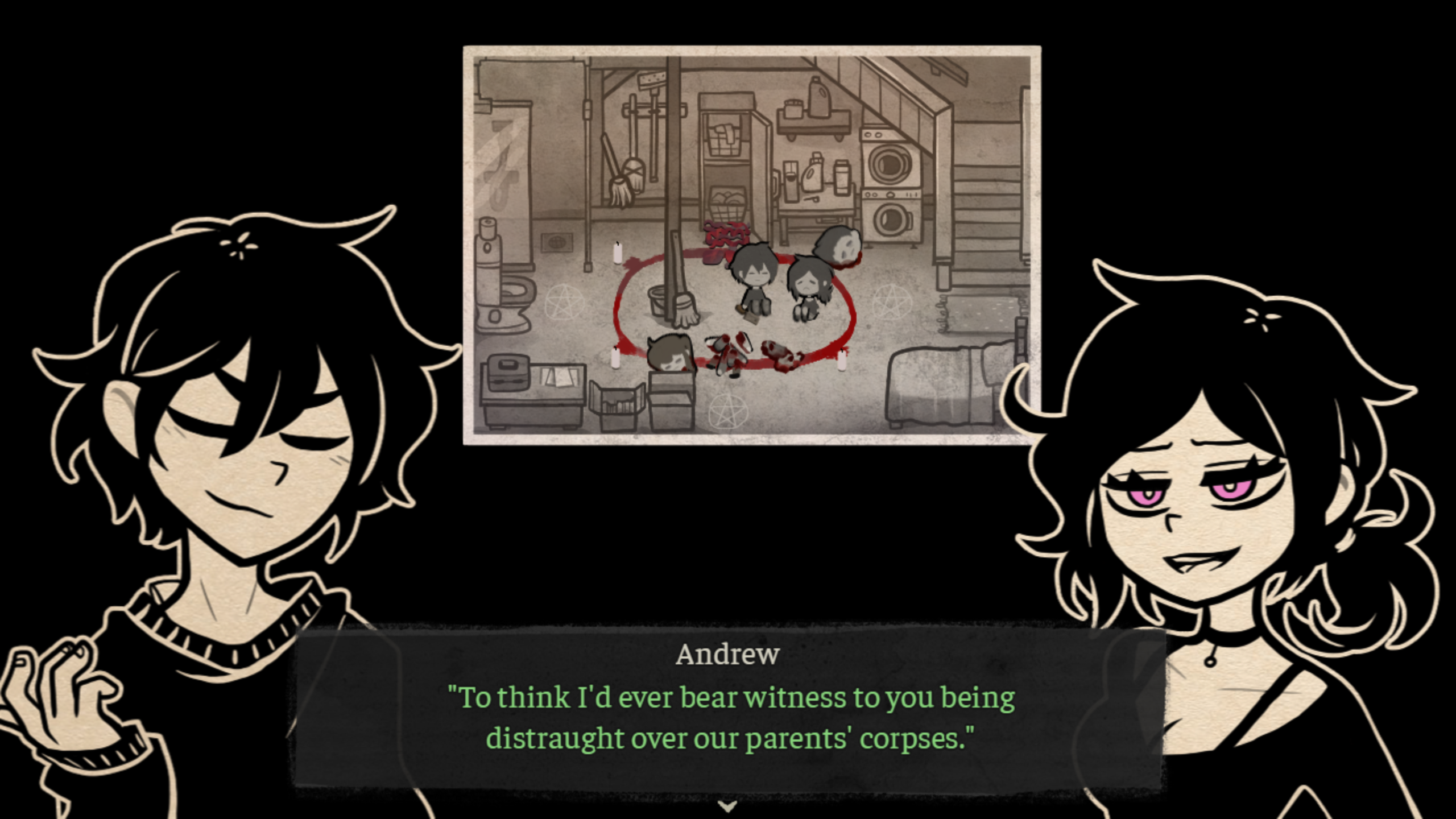
So that was neat.
It was far from the first time I’d thought about that topic, obviously, but it, y’know, it sparked a bit of a fire in me, I guess we can say. And at that point, pretty much all the pieces fell in place.
Not too long later, I conceived of a novel. The novel would follow two young women, loosely conceived as embodying my past self as I wish I’d been, doing what I wish I could’ve done, and my current self, doing what I’m currently doing and possibly sucking a little less at it than I am in real life. The initial names of these characters were Lorelai Paige Cooper and Cecilia Scarlett Foster, respectively. The plot was outlined as being set during covid quarantine, with the pandemic being the reason why Lorelai could neither stay outside (disease) nor return home (family hell) and thus justifying Cecilia giving her shelter.
The romance between them would have developed more gradually over a longer term, with Cecilia trying to act sensibly and keep Lorelai at arm’s length out of concern for both of their safety, before eventually giving into Lorelai’s advances. Cecilia would’ve then helped Lorelai murder her parents, which would have been the climax of the novel. And maybe then there would’ve been a follow-up about them forming a polycule with Lorelai’s siblings and also forming an organized crime ring devoted to political assassinations. Because, y’know, why not.
And now you see why this post is on my website and not the itch.io devlog.
Anyway, I ended up not writing any of this because I got burnt out and tired of it, as I have with most full-length novels I’ve attempted to write. So I ended up shelving all of this, and went back to trying to write video essays and Bang Dream fanfiction, which I also mostly got burnt out on.
But when the Toxic Yuri VN Jam came up, I decided to revive the idea.
My first two drafts of “Prisoners” were very loose and honestly pretty embarrassing, and I will not share them, not now, not ever, because they both suck. However, from the beginning, the structure was pretty radically changed from my original concept in order to fit the necessarily shorter format.
Obviously when Lorelai first met Cecilia, her parents were already dead, which changed the stakes of the story and impacted the plot structure considerably. I also changed the setting and the narrative setup to justify their meeting more cleanly and quickly than I’d been able to do in my original stabs at the idea. In my original outlines Cecilia was a musician, but I made her an otaku instead because, well, I haven’t been a musician since I was about sixteen, and writing what you know is a lot easier.
I’m using Cecilia and Lorelai as placeholder names right now, obviously, because at this point in this draft, they actually didn’t have any names. I knew right away that these two characters were different characters from the Cecilia and Lorelai I’d originally envisioned, but I didn’t know how they were different. When writing original fiction, I often tend to get really hung up on the characters’ names to the point that it hamstrings my focus on the actual story, so right then, I decided to just not think about names and figure out the flow of the story.
Right here is where, if this VN had had any sprites, I’d be presenting some character design sheets right about now, but I don’t have those. So instead, I’ll just be summarizing what my original characterization of the two was like.
My version of Cecilia, who would become Alice as we know, was a more quietly insecure and timid person who, like in the final version, had really bad self-esteem issues, but was ultimately not that bad. She told herself she was a bad person a lot in my second draft, said the whole line about having a good first impression, bad second impression, and terrible third impression and etc. But the idea in that version was that she just had a low opinion of herself because she’d been let down a lot by a lot of people and blamed herself for everything bad that’d happened to her. Like me.
Meanwhile, Lorelai slash Rachel was basically… honestly, really thin as a character. More or less a stereotype.
They were placeholder characters, without even placeholder names to define them. They were blatant, if unconscious, copies, imitations, xeroxes, of the MILF and the student in that one porn manga about the housewife cheating on her husband with a high schooler. They were not very good, and anything remotely original about either of them was just copied from my own real life character sheet.
There was something there, but they weren’t good characters. They just didn’t read like full and complete people on the page. And I kinda knew they weren’t good characters, but I didn’t know, in those first two drafts, how to make them good. And Ophelia didn’t know how to help me make them good, so she said, after a deeply frustrating back and forth:
“Okay, do you want to see how I’d do this, then?”
And I replied:
“Kinda, yeah.”
She took my second draft, went to work at her keyboard, and came back to me a few hours later with a fully rewritten version of the story.
I knew it would be better than mine, and I was pretty ready to feel fucking embarrassed.
I was.
She introduced new names to the characters, and brought out the characters I didn’t know were hiding behind my placeholder archetypes.
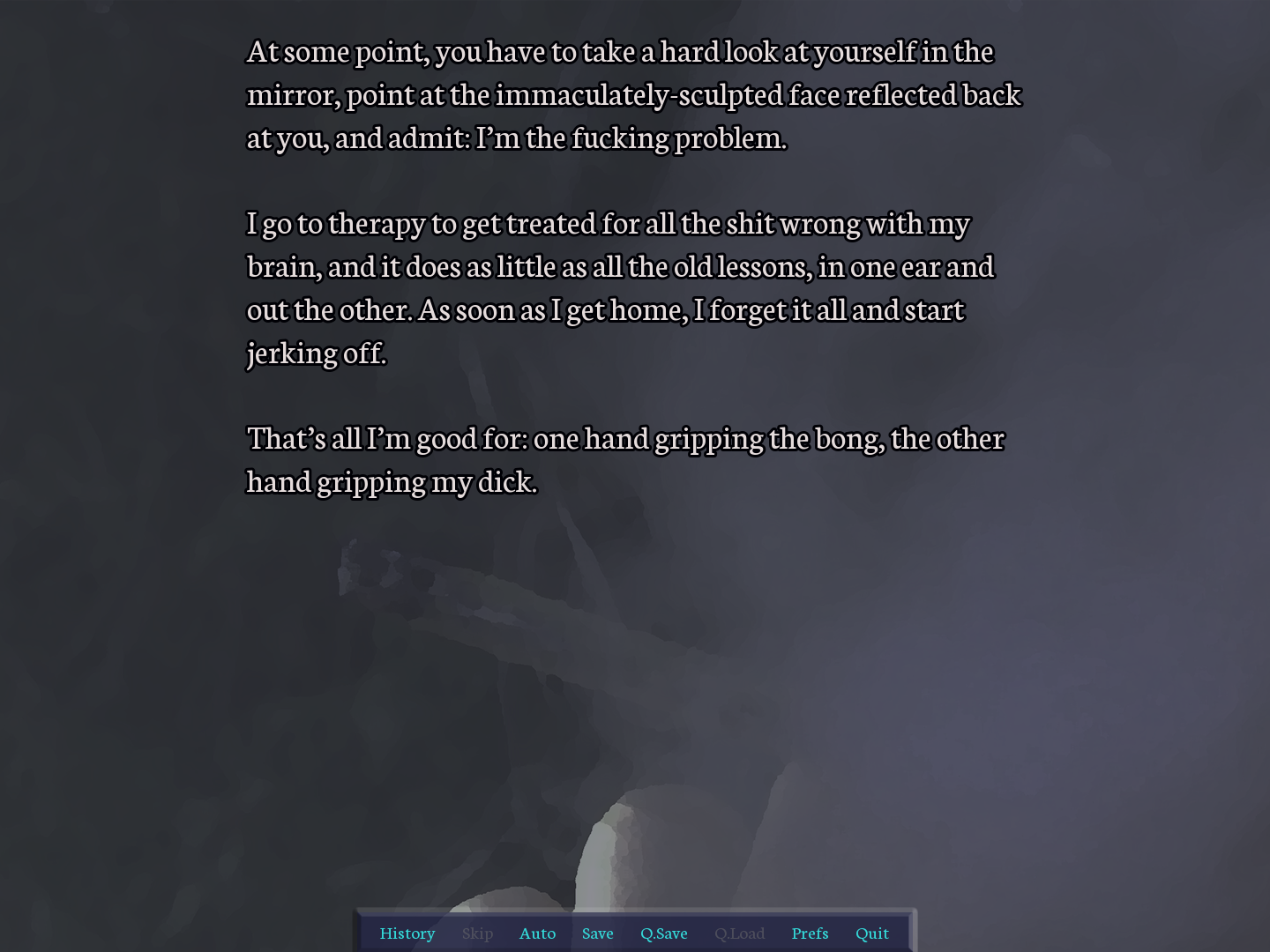
Ophelia’s biting, lyrical prose, Alice’s brash narration, the character and tone and flow of all of it. It’s a little hard to describe, honestly, how I fucking felt, reading my own story retold to me with such clarity, technique, and wit, but I’ll try, I guess.
She understood what I was saying with the story, of course, because I’d told her, but she understood how to tell it better than I had, without saying it outright how I’d said it, while making the point better than I could’ve ever made it, and the most key thing she’d done to convey it better than I ever could have:
she made Alice mean.
Instead of just being afraid of being a bad person, Alice just was a bad person. Instead of being my current self acting as an agent of the fantasy of helping rescue my past self, the way I’d envisioned Cecilia, Alice was my worst possible alternate universe current self making my worst possible alternate universe past self even worse.
I finished reading Ophelia’s rewrite, and I was left with the singular realization that of course she fucking gets it.
She knew better than me what my own story was about.
I told Ophelia we had to use her version. And she said yes. On the condition that I allow myself to be considered co-writer. Which, y’know. I guess I am. I still feel like she deserves way more of the credit than I do, because without her, the story would be a shallow shadow of its true potential, but I guess without me, it wouldn’t exist, so. Yeah. Fair.
I live in fear of the possibility that I’ll never measure up to Ophelia as an individual prose writer, but that’s a problem for another day.
I did make a few edits to Ophelia’s version, and she made a lot of her own edits, and a few dialogue lines still exist in the final version mostly as I originally wrote them. The plot was mostly unchanged from my drafts, but Ophelia introduced the idea of Rachel being homeschooled, which definitely made the plot work more smoothly and plausibly. Rachel's parents being fixated on stopping her from masturbating was also her idea.
Also, this is definitely going to be the only thing brought up not related to the writing, but, the whole idea of the house image being saturated red when the gunshot sound effect plays to communicate Rachel killing her parents was my idea. Ophelia really didn’t like it, thought it was stupid and cheesy, but I insisted on keeping it, because I thought it was cool. I said I’d consider removing it if our playtesters complained, but they didn’t, so I kept it.
I actually got the idea from killer7. Which is one of the greatest video games ever made.
So, I guess, with all that stuff about the writing process out of the way, I may as well answer the question of, why this story. Why did I decide to write a toxic yuri story about age gap and family murder, of all things?
There’s a lot of reasons, one of which being that I just think age as a theme is really interesting. I interacted with a lot of adults as a teen at casual social functions where I was unsupervised and not always immediately disclosing my age, and a lot of the time, they just kind of treated me as a normal person. Which, I’m sure had absolutely nothing to do with the fact that I had my growth spurt very early and was tall enough to pass as an adult to the casual observer.
Still, it made me wonder, especially going between those adults, and the two very specific adults at home who just happened to own me and control my life, what was really, meaningfully different between me and them, other than that they'd lived longer and had a bigger number? What was it about that, that made me not entitled to the same rights and range of decisions that they had? And, oh, god, that one older guitarist woman was hot, so why exactly couldn’t I, a sixteen and then seventeen year old of generally sound mind, fuck her if she was interested and consenting just as much as I was? Why was that such a big fucking deal?
I’ve spent the nearly a decade of time since then turning over all of those questions over and over, while continuing to mostly engage with works of fiction about teenagers, as I continued to get further and further away from being one. And I’ve seen the “unrequited (or occasionally requited!) student-teacher crush” trope in anime (and in American teen fiction, too, let’s not pretend this is just a Japanese thing) often enough to be cognizant of the obviously observable reality that teenage me was definitely not alone in this.
Contrary to what some people on the internet will tell you, this is actually a really normal teenage fantasy. It’s normal. It’s fine. And the fantasy did stick with me, so, naturally I felt something when I started stumbling on yuri stories that centered it as a theme. Most of which are mostly unofficially living on the scans of dynasty and nowhere else, for reasons of… well, y’know, English yuri Twitter tried to cancel Hitoma Iruma over writing student-teacher yuri earlier this week, so yeah.
I do think it’s a genuinely interesting theme beyond just being titillating, because like, however you go about writing it, you have to, one way or another, in a story about this kind of thing, address the age issue. And age is actually a genuinely interesting social institution that I think is interesting to talk about. Like, sure, in the most literal sense it is, as certain types say, “just a number”. But also it’s not just a number. It’s there to measure the universally understood true but also wildly subjectively experienced fact that time confers experience, and experience, at least ostensibly, makes you wiser with time.
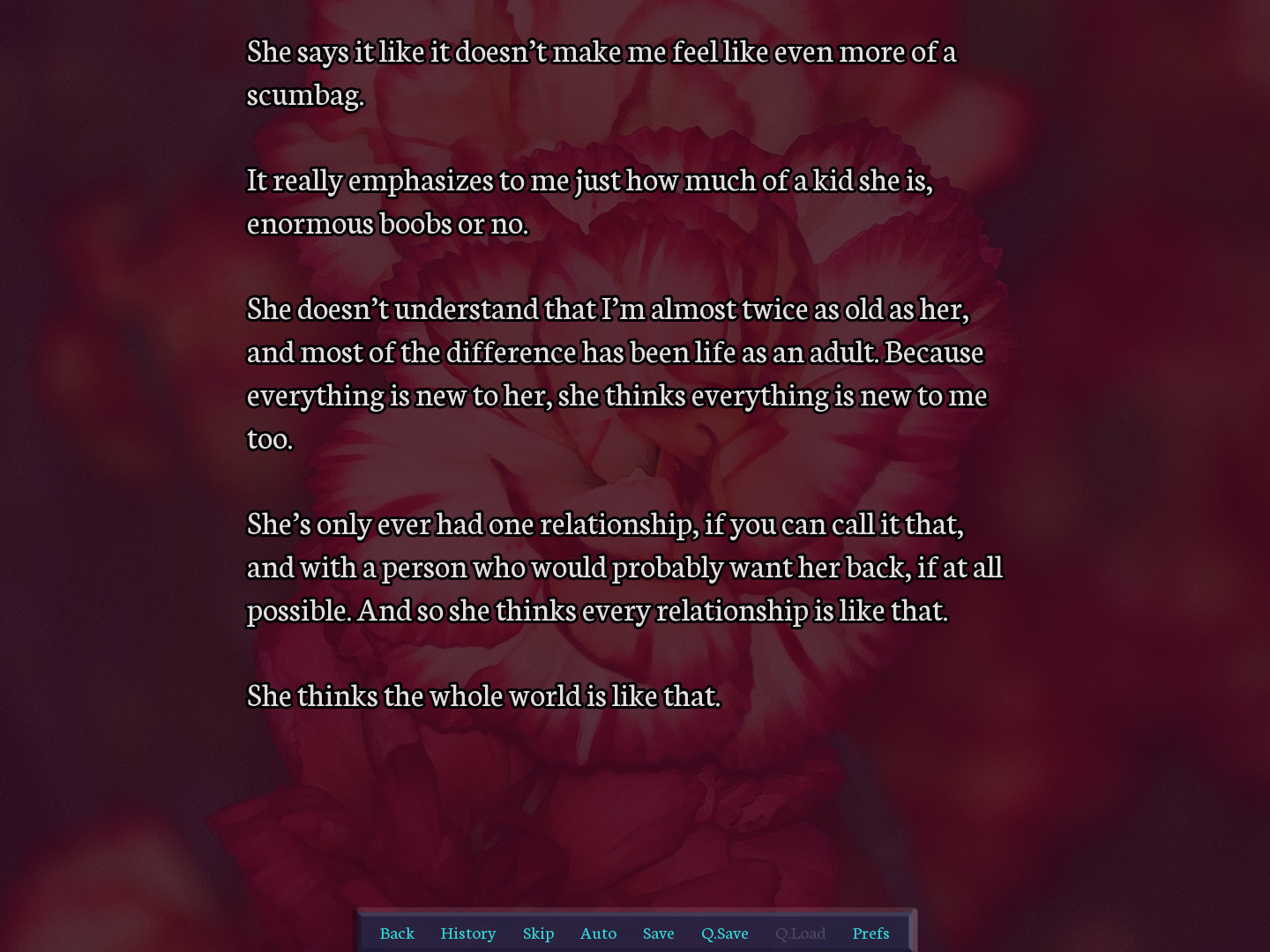
But because it’s experienced so subjectively and so wildly differently between individuals, and different people experience coming of age at different times in their lives, depending on like, what kinds of lives they led, and some people are just kind of immature forever, by some subjective measurement, the question of what those numbers really correspond to is an interesting philosophical matter. What made the difference between me at seventeen and me at eighteen, and what makes the difference between me then and me now at twenty-six, going through my second puberty as a trans woman?
Prisoners in the Mirror is, to me, a personal story about examining what those differences really entail, about reflecting on my experience of the unfortunately exploitative tradition of how children are brought up in this world, and about the difficulty of escaping from one’s family and the tough position one is placed in when they need to escape before society says they’re ready to be free. It’s about how the legal restrictions one is placed under as a minor, ostensibly there to protect, in actual practice open minors up to exploitation. It’s a reflection on the exploitation I was subjected to, the exploitation I’m capable of, and playing with my thoughts and feelings about how with a few extra bad decisions, or just a few cosmic nudges, it all could’ve been way worse.
I want people who read this story to think about what it actually means for Rachel to be a minor in this situation, what forces confer that status upon her, and whether those forces are natural. I want to provoke introspection about what being a minor makes her subject to. I want you to consider, as much as the thought of these two characters fucking may disgust you, the exact reasons why it’s bad for them to do that, and what exactly would make it less objectionable or problematic, if anything, if Rachel wasn’t a minor.
Why is it perfectly socially okay for Rachel’s conservative ultrareligious parents to confine and sexually control her, but awful and repugnant for Alice to do the same? Why would Rachel be considered an adult on trial for murder, and a minor if Alice were to be put on trial for statutorily raping her? What if Rachel had just been free to leave her parents without using force to escape? What if it wasn’t a crime for her to be free as a minor, what if it wasn’t a crime for her to consent? Would she still be vulnerable in the same way? In such a situation, would it still be bad for her and Alice to be together? Well. It probably would still be bad. But it would probably be less bad, wouldn’t it?
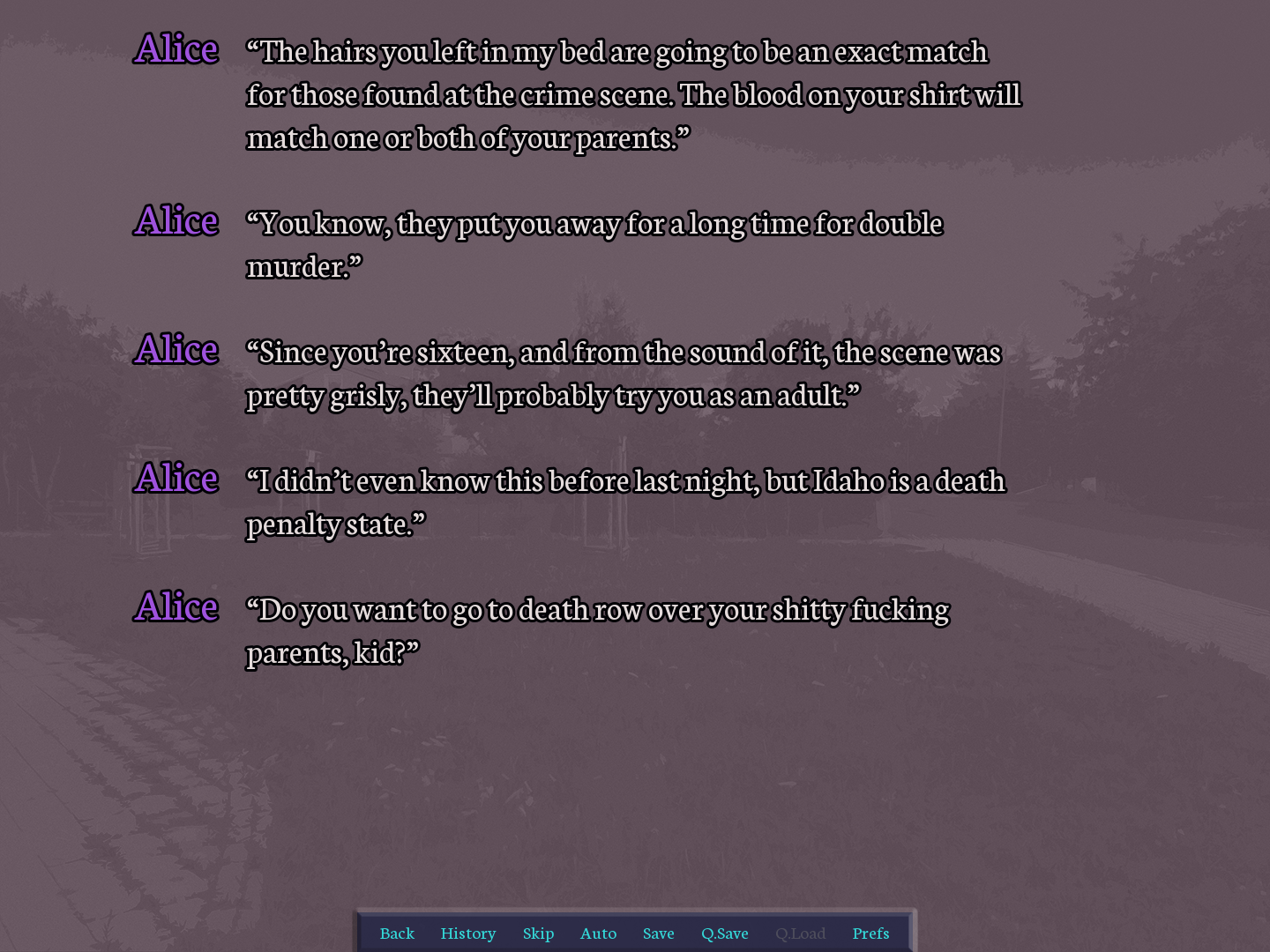
I’m not a neutral party, of course, and I’m not posing any of these questions impartially. I wrote the story this way for a reason, and I have my own view of the scenario and my own conclusions that I’m trying to lead people to about this. Alice would maybe feel nervous about being cancelled, but she’d probably just have let Rachel leave at the end, because she wouldn’t be guilty of any crimes and wouldn’t feel compelled to commit more crimes to try and save her own skin. And even if she had, Rachel would’ve been able to just leave, because she wouldn’t have been guilty of anything either. And yeah, maybe one or both of them would’ve regretted their one-night stand. But if that’s all that would’ve happened to them, then there’s way worse things in the world, right?
This situation doesn’t exist in a vacuum. The incentives for both Rachel and Alice’s actions are created by the laws under which they live, and the laws dictate that they’re criminals, and it’s precisely because of that reason that they feel compelled to do more and worse crimes to keep their freedom. The society they live in creates the laws, and every law creates a crime. Do those laws really keep people safe?
Obviously this is all sophistry, I guess. I don’t know that there’s some specific universally applicable cutoff point at which people become automatically mature enough to live on their own, or consent to sex, and scientifically speaking, no one does. I don’t know any of what would realistically happen in the situation described in the story, or what would happen if the situation in the story went differently, because, um, Ophelia and I made it up. At the end of the day I don’t think adults and teenagers having sex, especially in this society we’ve made where younger people are generally more at risk by default, is advisable. And as much as I hate seeing people put “minors DNI” in their bios, I don’t think it’s a great idea to intentionally specifically seek out minors to interact with either.
Still, it is a lot more complicated than most people make it out to be. And I think it’s really fucking awful that the way our current society deals with all this is by flattening the issue down to treating everyone under eighteen as inherently lesser human beings who are reduced to property of parents and rhetorical props in political campaigns, and everyone who seriously questions the social institution of age as an evil degenerate pedophile who needs to be excommunicated posthaste. It’s bad, it sucks, and it means that the only meaningful, remotely practical answer on offer in our current social climate, is, well, uh. Youth liberation yesterday, you fucks.
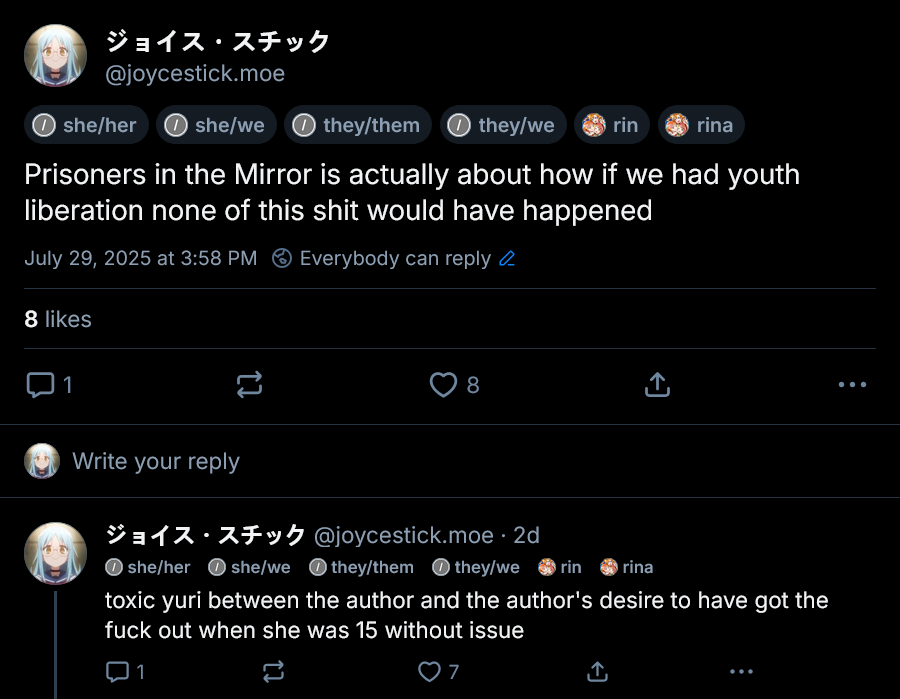
And also also, read Contract Sisters.
Because that manga’s really fucking good.
